How to replace a riding lawn mower rear tire
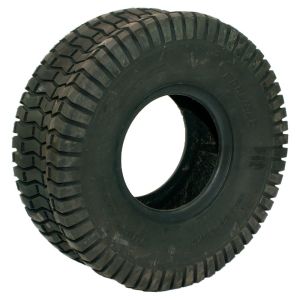
This step-by-step riding mower repair guide shows how to replace the rear tire on your lawn tractor or riding lawn mower if the tire is too damaged to repair. Installing a new rear tire is relatively easy and requires just a few tools and a manufacturer-approved lawn mower part.
Use this repair guide and video to replace the rear tire on Craftsman, MTD, Husqvarna, Murray, Troybilt, Toro, Snapper, Yard-Man, Weed Eater, Ariens, John Deer and Southern States lawn tractors and riding lawn mowers.
If the tire just has a puncture in the tread, you can fix it with tire sealant. The video How to Repair a Riding Lawn Mower Tire shows how.
This video explains how to replace the rear tire on a riding lawn mower.
Instructions
- 01.
Disconnect the spark plug
Park the riding mower on a level surface and set the parking brake.
Turn the ignition switch off and remove the key.
Wear work gloves to protect your hands and safety goggles to protect your eyes.
Lift the riding lawn mower hood and disconnect the spark plug wire.
Lower the tractor hood.
Tip: Disconnect both spark plug wires if your engine has 2 cylinders.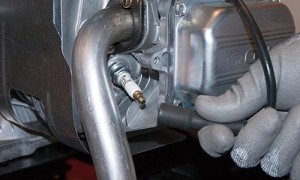
PHOTO: Disconnect the spark plug.
- 02.
Jack up the riding mower
Block the front tires to keep the riding mower from rolling.
Position the jack under the frame and jack up the riding mower to raise the rear wheel.
Place a jack stand under the frame to support the riding mower.
Remove the jack.
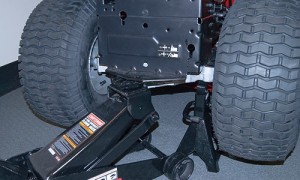
PHOTO: Jack up the riding mower.
- 03.
Remove the rear wheel
Pull off the axle cover.
Remove the retaining ring and then pull off the washer.
Pull the tire off the axle.
Remove the square key.
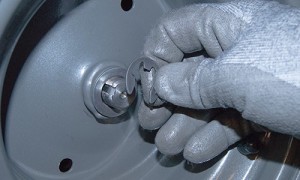
PHOTO: Remove the rear wheel.
- 04.
Remove the tire
Remove the valve stem cap.
Remove the valve stem core, which lets any remaining air out the tire.
Break the tire bead and pry the tire off the wheel rim on one side.
Pry the tire off the rim on the other side.
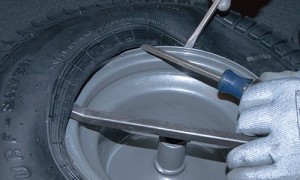
PHOTO: Break the tire bead and pry the tire off the rim.
- 05.
Install the new tire on the rim
Clean the wheel rim.
Lay the new tire flat on a work surface.
Lubricate the top tire bead with liquid detergent.
Pry the rim into the top side of the tire.
Flip the rim and tire over.
Lubricate the tire bead with liquid detergent.
Pry the remaining side of the tire onto the rim.
Warning: Use blunt tools to pry the tire to avoid damaging the tire bead.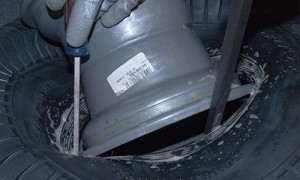
PHOTO: Pry the new tire onto the rim.
- 06.
Seal the bead to the rim
Fill the tire with air to seat the tire bead.
Reinstall the valve stem core.
Fill the tire fully with air.
If the tire doesn't fill with air, install ratcheting tension straps around the outer edge of the tread on each side of the tire.
Tighten the straps to force the beads outward.
Fill the tire with air to seat the tire bead.
Reinstall the valve stem core and fill the tire with just enough air to keep the beads seated.
Carefully release the tension straps and then remove the straps.
Tip: If the tire didn't fill with air, install a ratcheting tension strap around the center of the tire tread, tighten the strap to force the beads outward, and fill the tire with air to seat the tire bead. Carefully release and then remove the strap.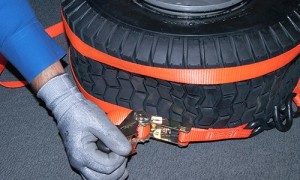
PHOTO: Seal the bead to the rim.
- 07.
Reinstall the wheel
Slide the wheel on the axle and line up the key slots in the rim and axle.
Apply anti-seize compound to the square key.
Push the key into the rim.
Reinstall the washer and snap the retaining ring onto the axle.
Push the axle cover onto the wheel.

PHOTO: Lubricate the square key.
- 08.
Lower the riding mower
Push the jack under the frame and raise the riding mower.
Pull out the jack stand.
Lower the riding mower to the ground.
Remove the wood blocks from the front tires.

PHOTO: Lower the riding mower.
- 09.
Reconnect the spark plug
Raise the tractor hood.
Reconnect the spark plug wire and lower the hood.
Tip: Reconnect both spark plug wires if your engine has 2 cylinders.
Most common symptoms to help you fix your riding mowers & tractors
Choose a symptom to see related riding mower and lawn tractor repairs.
Main causes: faulty battery, bad alternator...
Main causes: damaged cutting blade, worn deck pulley, damaged mandrel pulley, loose fasteners on mower deck components...
Main causes: damaged tie rods, bent or worn wheel spindle, worn front axle, damaged sector gear assembly...
Main causes: worn or broken blade belt, broken belt idler pulley, blade clutch cable failure, bad PTO switch, damaged ma...
Main causes: punctured tire or inner tube, leaky valve stem, damaged wheel rim...
Main causes: engine overfilled with oil, leaky head gasket or sump gasket, damaged carburetor seals, cracked fuel pump, ...
Main causes: clogged carburetor, damaged flywheel key, dirty spark plug, stale fuel, improper valve lash, engine needs a...
Main causes: shift lever needs adjustment, neutral control needs adjustment...
Main causes: worn or broken ground drive belt, bad seat switch, transaxle freewheel control engaged, transaxle failure, ...
Most common repair guides to help fix your riding mowers & tractors
These step-by-step repair guides will help you safely fix what’s broken on your riding mower or lawn tractor.
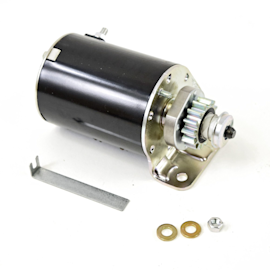
How to replace the starter motor on a riding lawn mower
If you hear the solenoid click but don’t hear the starter motor spin when you turn the key, follow these steps to replac...
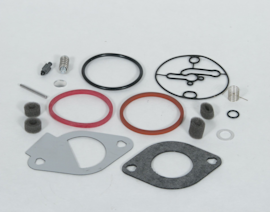
How to rebuild a riding lawn mower carburetor
Get your sputtering carburetor running smoothly in 60 minutes....
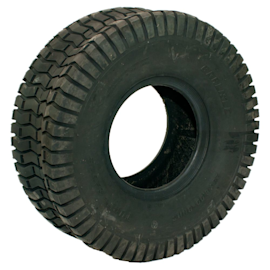
How to replace a riding lawn mower rear tire
Your mower can’t run on a damaged rear tire. Here’s how to install a new one....
Effective articles & videos to help repair your riding mowers & tractors
Use the advice and tips in these articles and videos to get the most out of your riding mower or lawn tractor.

Learn about all the convenient features on our Sears PartsDirect website that make your parts purchases easier....
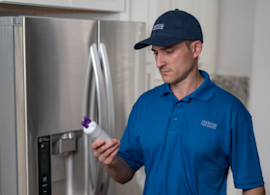
Get answers to frequently asked questions about Sears and Sears PartsDirect....
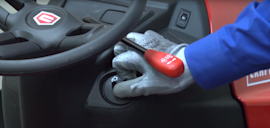
Check the starter solenoid, starter motor, wiring, battery and engine....